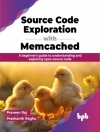There’s a lot to be said for going back to basics. Not only doesthis Bible give you a quick refresher on the structure ofopen-source Linux software, it also shows you how to bypass thehefty graphical user interface on Linux systems and startinteracting the fast and efficient way?with command lines andautomated scripts. You’ll learn how to manage files on thefilesystem, start and stop programs, use databases, even do Webprogramming?without a GUI?with this one-stop resource.
Inhaltsverzeichnis
Acknowledgments.Introduction.Part I The Linux Command Line.Chapter 1: Starting with Linux Shells.Chapter 2: Getting to the Shell.Chapter 3: Basic bash Shell Commands.Chapter 4: More bash Shell Commands.Chapter 5: Using Linux Environment Variables.Chapter 6: Understanding Linux File Permissions.Chapter 7: Working with Editors.Part II Shell Scripting Basics.Chapter 8: Basic Script Building.Chapter 9: Using Structured Commands.Chapter 10: More Structured Commands.Chapter 11: Handling User Input.Chapter 12: Presenting Data.Chapter 13: Script Control.Part III Advanced Shell Scripting.Chapter 14: Creating Functions.Chapter 15: Adding Color to Scripts.Chapter 16: Introducing sed and gawk.Chapter 17: Regular Expressions.Chapter 18: Advanced sed.Chapter 19: Advanced gawk.Part IV Alternative Linux Shells.Chapter 20: The ash Shell.Chapter 21: The tcsh Shell.Chapter 22: The Korn Shell.Chapter 23: The zsh Shell.Part V Advanced Topics.Chapter 24: Using a Database.Chapter 25: Using the Web.Chapter 26: Using E-Mail.Chapter 27: Shell Scripts for Administrators.Appendix A: Quick Guide to bash Commands.Appendix B: Quick Guide to sed and gawk.Appendix C: Comparing Shells.Index.
Über den Autor
Richard Blumhas worked in the IT industry for over 18 years as both a systems and network administrator. He has administered UNIX, Linux, Novell, and Microsoft servers, as well as help design and maintain a 3, 500-user network utilizing Cisco switches and routers. He has automated network monitoring with Linux shell scripts and written scripts in most of the common Linux shell environments. He is the author of several books, including Professional Linux Programming (Wrox) and Linux For Dummies, 8th Edition (Wiley).












